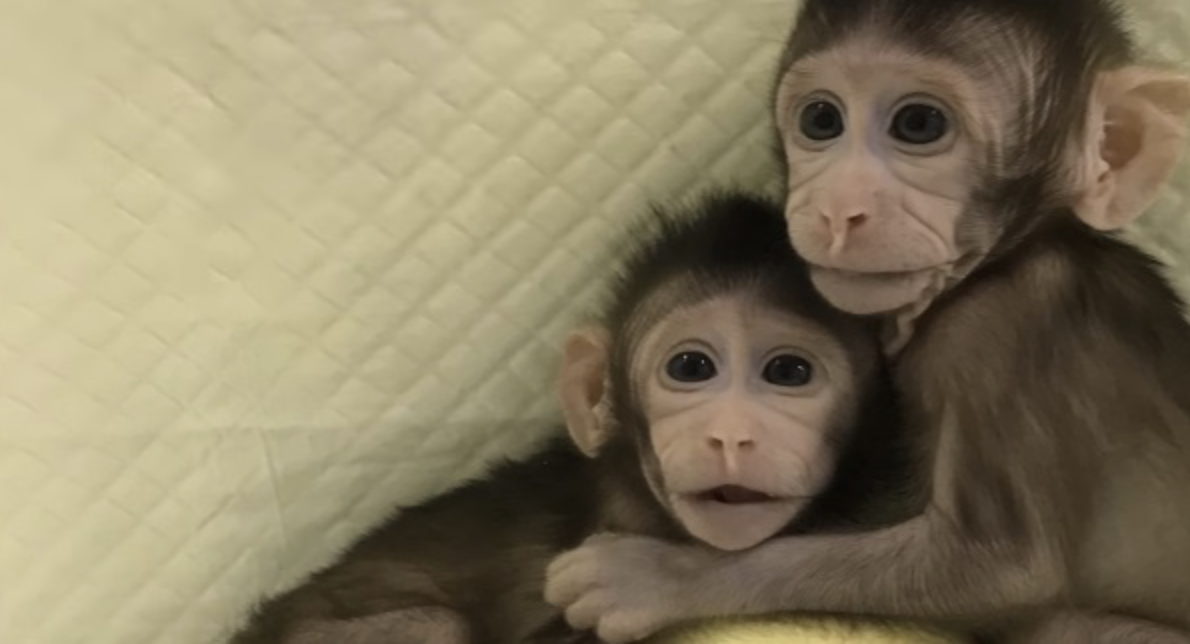Worries arise following successful monkey cloning by Chinese scientists
The cloned monkeys huddle while adjusting to the photographer's presence.
Chinese scientists have cloned the first non-human primate, sparking a massive worldwide debate about cloning.
According to National Geographic, monkeys Zhong Zhong and Hua Hua were made using somatic cell nuclear transfer. This procedure starts when the nucleus from one animal's cell is transferred into another animal's egg. A successful transfer results in a pregnancy and birth of an animal genetically identical to the nucleus donor.
This feat is a breakthrough in biomedicine. Many researchers said these monkeys, and the ones to come after them, are beneficial for studying human diseases — especially neurological diseases such as Alzheimer’s and Parkinson’s.
Biology professors Jo Beth Boyer and Dr. Lori West both commented on the great advantages of using cloned animals for drug testing. Using inbred animals such as mice in medical research is extremely common. However, due to some key differences between mice and humans, limitations on the accuracy of the research can hold scientists back.
According to West, being able to clone non-human primates like these monkeys would make understanding the benefits and potential side effects of the medications much easier and more valid.
Sophomore pre-med major Sarah Sajja said cloning could have more advantages beyond drug research and testing.
“Cloning could possibly teach us how to better combat hereditary illnesses and potentially save lives,” Sajja said.
Not only could these clones provide answers for researchers, but they also serve as a tool for students. Sajja said that she believes it would be fascinating to work on or with a cloned animal for research.
“If the cloning is being done for biomedical research, then I believe it can give us insight that enables the scientific community to better grasp how our bodies respond to certain diseases or get a deeper understanding,” Sajja said.
However, with milestones as big as this one, controversy is sure to arise. In this case, ethical arguments condemning the research have already surfaced.
According to West, one concern indicated is that clones may be considered of lesser value by society. But Boyer and West assuaged fears that human cloning will soon be a major concern.
Animal welfare groups have also cast experiments on non-human primates as cruel due to their similarities to humans. They also show worry over the process of cloning itself. Many have said they see the cloning of animals as unnatural and are concerned it would give rise to the idea that animals are disposable.
Vice president of animal research issues at the Humane Society of the United States Kathleen Conlee said the cloning of animals creates a dangerous mindset and precedence.
“It gives this sense that animals are disposable and commodities for us to use,” Conlee said. “Is this appropriate, to have an animal you can do whatever you want to? … It creates a poor dynamic about how we treat animals overall.”
Senior vice president of animal rights group PETA Kathy Guillermo said that Zhong Zhong and Hua Hua represent a perilous downhill slide.
“Cloning is a horror show: a waste of lives, time and money. And the suffering that such experiments cause is unimaginable,” Guillermo said. “Because cloning has a failure rate of at least 90%, these two monkeys represent misery and death on an enormous scale.”
Even with the concerns and backlash, some researchers said they insist that these clones are a necessity for studying human diseases and disorders. These models, according to the researches, can assist with anything from Parkinson’s to HIV/AIDS to autism.
Researchers are noticing the insufficiency of in-vitro and computer model research and have said they do not think there will ever be a way to avoid non-human primates in biomedical research.
What could be next with this accomplishment? Chinese researchers said they hope that societies will realize that, once they demonstrate the cloned monkeys’ necessity, cloning will become more widely accepted. The possibilities could be endless.
For more information, on the Zhong Zhong and Hua Hua, visit http://ow.ly/eHOJ30iyIrX.
For more information on cloning in general, visit http://ow.ly/gR4630iyIq5.



